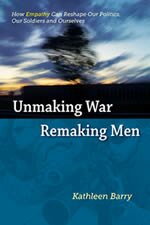On Memorial Day, we look at the intimate connections between militarism and masculinity in our culture.
One day at a beach Kathleen Barry witnessed an accidental death. Seeing how empathy drew together the bystanders – strangers until that moment – in shared human consciousness, she asked: 'Why do we value human lives in everyday moments but accept the killing in war as inevitable?' In Unmaking War, Remaking Men, Kathleen Barry explores soldiers' experiences through a politics of empathy. By revealing how men’s lives are made expendable for combat, she shows how military training drives them to kill without thinking and without remorse, only to suffer both trauma and loss of their own souls.
Kathleen is the author of five books. For her work on trafficking of women, Kathleen was named by Marie-Claire magazine one of the 100 women who most changed the world.
Kate Raphael talks with Kathleen about how we can use empathy to end war and violence against women. Listen now.
 For almost a century until the mid-1960s, tens of thousands of ordinary people attended the lynchings of more than 4,000 African Americans that often included torture, mutilation and photography. This form of racial violence occurred in every state across the U.S. but four, and for reasons as arbitrary as sheer boredom. Lynchings were at times highly organized and akin to the sport of hunting, and blacks were “always in season.”
For almost a century until the mid-1960s, tens of thousands of ordinary people attended the lynchings of more than 4,000 African Americans that often included torture, mutilation and photography. This form of racial violence occurred in every state across the U.S. but four, and for reasons as arbitrary as sheer boredom. Lynchings were at times highly organized and akin to the sport of hunting, and blacks were “always in season.”
Director Jacqueline Olive discusses her work in progress, "Always in Season." This documentary feature film encourages viewers to consider where their own family stories intersect with this difficult chapter in American history. "Always in Season" shows how lynching still affects Americans and follows the efforts of descendants who are turning harm to hope with grassroots efforts towards reconciliation and restorative justice.
Jackie spoke with KPFA Women's Magazine's Kate Raphael. 26:35

No comments:
Post a Comment